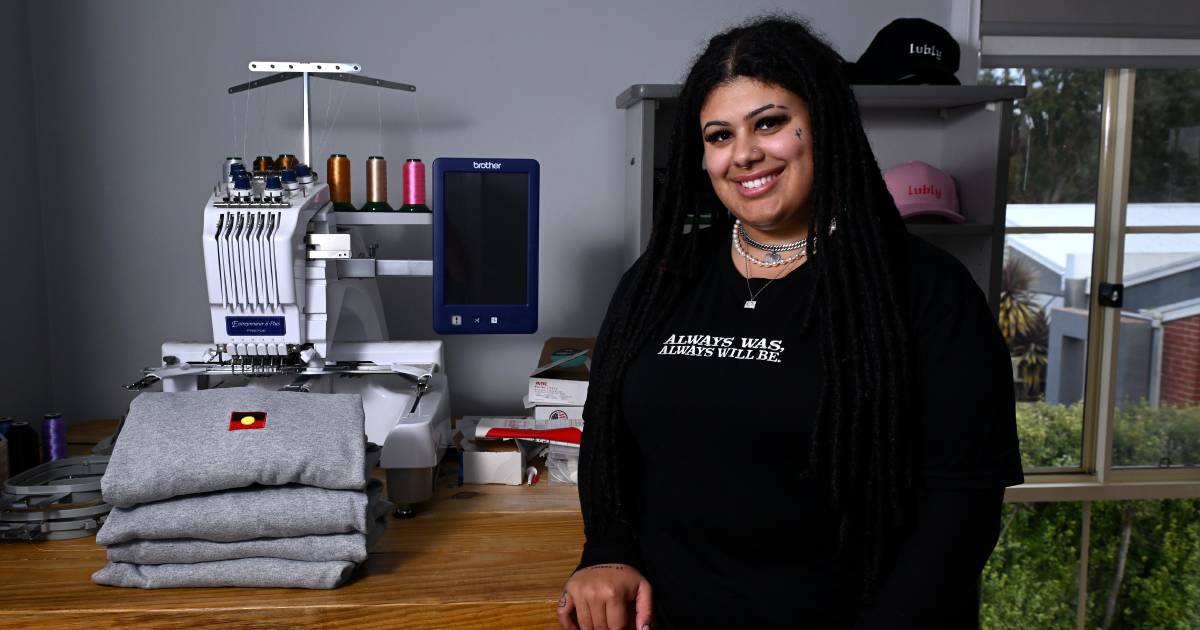At the height of the Black Lives Matter protests in 2020, Wotjobaluk woman Indya Hayes decided she needed to contribute.
“My Dad is African American and my mum is Aboriginal, so it’s a movement that’s very close to my heart and it’s something that I feel really strongly about,” she said.
“And I just felt like I wasn’t having an impact.”
While the US was in the midst of a reckoning on police brutality, in Australia the Black Lives Matter (BLM) movement prompted difficult conversations about the legacy of colonialism and the disproportionate incarceration of First Nations people, who were imprisoned at 14 times the rate of non-Indigenous adults in 2021.

After dusting off her embroidery machine and purchasing a handful of hoodies from Big W, Ms Hayes sewed on the garments George Floyd’s last words before he died, “I can’t breathe”.
Her business, The Minority Co, was born.
Wearing your values
Today the brand has more than 14,000 followers on Instagram, and rapper Adam Briggs has donned one of her hoodies on the front cover of GQ magazine.
Senator Lidia Thorpe and actor Jason Momoa have also rocked her clothes.
With slogans like “Tis the season to be deadly” and “Hot people don’t celebrate January 26”, Ms Hayes merges Gen Z parlance with political statements – and the results encourage people to wear their values.
What began as a side hustle immediately sparked interest online. Suddenly, she was spending her nights embroidering while working full-time in disability support and education.

“I don’t have any business background, my parents don’t have any business background. I literally had no idea what I was doing,” she said.
“I remember saying to Mum, ‘I just don’t know if I can do this’. And she was like, ‘Just take the chance, like, what’s the worst thing that can happen?’ And honestly, it’s the best thing I’ve ever done.”
Now 24, Ms Hayes said despite sold-out products and celebrity support, changing minds is still her main goal.
“If one person were to see one of my jumpers and start a conversation, that’s all I could ever hope for, just spreading that awareness,” she said.
Time, money and marketing
While continuing to grow The Minority Co is her passion, Ms Hayes says the brand will remain a side project for the foreseeable future.
With a mortgage, bills, full-time work and the busy social life of a person in her early 20s, she said it can be difficult to maintain motivation.
“With a clothing business it is extremely difficult to stay relevant. You have to stay on top of the current trends and you have to push your image on social media,” she said.
Working on Wadawurrung country, running a small business from regional Australia is not without its challenges when it comes to funding, marketing and time.
Support in regional communities
The Ballarat business community in Victoria has been supportive of The Minority Co, sharing her products on their social media platforms and reaching out for support.
In 2022 Ms Hayes’s work was celebrated by Ballarat council when she was awarded the Youth Innovators Award.
University of New England (UNE) business expert Professor Alison Sheridan said regional communities understood small businesses were the backbone of bush economies and needed support.
“For regional entrepreneurs, connections within their communities matter,” she said,
“They are motivated by goals beyond individual economic gain.
“There is a strong relational aspect to what they do, as they see how they contribute positively to their community and how they benefit from their community’s support,” she said.
Indigenous entrepreneurship promotes self-determination
The social conscience underpinning her clothing brand extends to Ms Hayes’s allocation of profits.
Ten per cent goes towards supporting Indigenous education and literacy charities.
Research shows Indigenous business owners are drivers of social innovation because they are embedded in family, social values and community networks.
The same 2021 study, published in the Journal of Australian Indigenous Issues, found Aboriginal and Torres Strait Islander entrepreneurship could improve the welfare of First Nations communities through promoting self-determination and economic stability.
The number of Indigenous startups in Australia grew by 30 per cent in the past decade, and the top 500 Indigenous corporations contribute $1.6 billion to the Australian economy.
Ms Hayes said she thinks the entrepreneurial spirit of young Australians is fuelling a cultural shift, and she hopes her success will motivate others to pursue their goals.
“Seeing young people be able to work for themselves and make their own money, rather than working for other people, is amazing,” she said.
“It’s a learning curve, it gives you motivation to strive to be better. And it’s so empowering.”
My story

I’m so inspired by the stories in Young and Regional: We Mean Business.
My generation is brimming with innovation and it’s vital we support our young entrepreneurs with the resources and funding they deserve.
Too often we focus on the deficits of young people in the regions – lower education rates and more prevalent mental health issues that come with a lack of access to services.
But this series reminds us that our small towns and regional centres are full of inspiring young minds that must be nurtured.
Indya’s story is one of self-determination and passion. From humble beginnings she’s built a mini empire and is sparking important conversations about racism and colonialism along the way.
Working two jobs and sewing every one of her garments by hand, it’s a classic Gen Z story of a side hustle with a profound social conscience.
More from Multimedia
More from Multimedia
More from Multimedia

